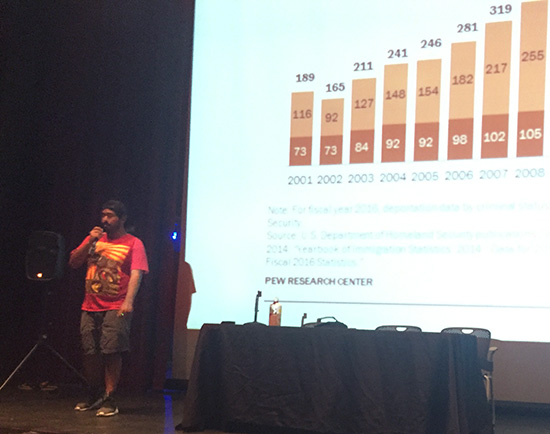“Know Your Rights” Training Explains Immigration Laws on Campus
Immigration and Customs Enforcement officers cannot enter a classroom during class time without permission, about 220 people were told at a “Know Your Rights” training Sept. 8 at UNM.
The training focused on how to handle ICE officers on campus and support undocumented college students.
One of the main goals of the training was to educate people about how faculty and staff at UNM can support students who impacted by President Donald Trump’s recent decision to end protections for young people brought to the United States without documentation.
Eduardo Esquivel, an undergraduate student at UNM and a member of UNM’s Dream Team, said there are many myths being spread about immigrants in the United States, so education is important.
“We need to educate as many people as possible,” Esquivel said.
For some faculty members, becoming more educated meant traveling 140 miles to attend the training.
Sylvia Andrew is a professor of Human Services at UNM Gallup, and traveled to the main campus to bring the information presented back to her students.
“I think it’s important because anytime UNM puts on these educational events and opportunities, it stretches all of us,” Andrew said. “We need to come together and use the knowledge and power that exists here.”

An undocumented immigrant is someone who does not have legal status in the United States, according to Esquivel. There are some administrative measures – such as DACA – that are meant to offer temporary relief, but not permanent solutions.
With Trump’s action, no new DACA applications will be accepted. However, if someone’s current DACA status expires between now and March 5, 2018, one can apply for renewal before Oct. 5, 2017 for a two-year extension.
Attorney Rebeka Wolf spoke about what happens when ICE comes to UNM.
According to Wolf, one of the important things to think about is whether or not the person being detained is in a public space, a limited access space or on private property.
In a public space, ICE officers do not need a warrant to detain someone. On private property, a judicial warrant is necessary. A judicial warrant must be signed by a judge.
A Warrant for Arrest of Alien is what is required to arrest someone in a public place, which is signed by an ICE officer or a supervisor.

College campuses are public spaces, except for certain areas with restricted access. For example, if a key card has to be swiped to enter a building, that building is considered a limited access space. These spaces also require a judicial warrant for ICE officers to enter, unless someone allows the officers access.
“ICE relies on consent…to an enormous extent,” Wolf said.
This means ICE officers would need permission to enter the classroom during class time, according to D75 of the UNM Faculty Handbook.
“University policy permits only enrolled students, persons authorized by the instructor, and administrative personnel to be admitted to instructional areas during scheduled periods,” the handbook said.
Because ICE officers are not administrative personnel, the instructor would have to invite the officers into the classroom for them to legally enter.
People are not required to answer questions posed by ICE officers, Wolf said. Faculty members do not have to point out specific students or give officers access to student schedules.
“If an ICE officer comes to your classroom and asks where is Joe Smith, no obligation to point out who Joe Smith is,” Wolf said.
In general, Wolf said that it is important to put pressure on the university itself to make statements supporting DACA and undocumented students as well as enacting legislation that aligns with sanctuary campus policies. One way to do that is to join the UNM Sanctuary Campus.
The UNM Sanctuary Campus, which hosted the event, is a group of faculty members at UNM advocating for undocumented students by supporting making UNM a sanctuary campus, according to its Facebook page.
The most important thing coming from making UNM a sanctuary campus, according to Armando Bustamante, the student programs specialist at El Centro de la Raza, is providing a more welcoming and secure environment for undocumented students.
“Our students feel a little bit safer, and that’s what’s important,” Bustamante said.
For Cristen Conley, an attorney with the Institute of Public Law, attending the training was both to benefit herself as well as to inform her coworkers.
“It was just personal about what’s up, what’s going on, and what we need to do,” Conley said. “Professionally, it’s just informing the work I do with students and also taking the information back to my coworkers.”
Sandra Bauman, operations specialist from the Office of Medical Educator Development in the School of Medicine said that she attended the training to learn about the resources available and to be a better ally.
“Diversity is important,” Bauman said. “Treating people with integrity and respect is important and knowing how to listen well and offer resources if I know of them is important.”

